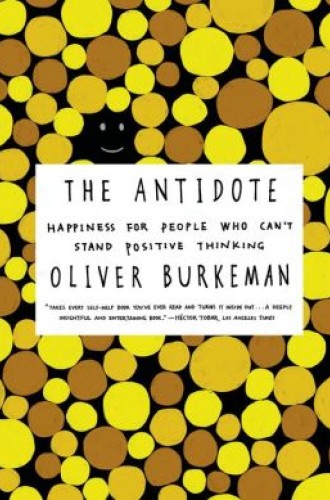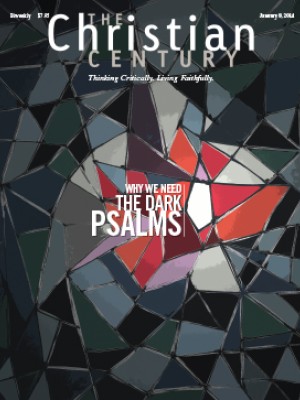The Antidote, by Oliver Burkeman
Happiness sells. So do books promising a way to help you be happier—especially when they carry the designation “Christian.” In her 2009 book Bright-Sided: How Positive Thinking Is Undermining America, social critic Barbara Ehrenreich traces the genealogy of positive thinking ideology back to religious Americans: for example, Norman Vincent Peale, author of the 1952 best seller The Power of Positive Thinking, and Mary Baker Eddy, the 19th-century founder of Christian Science. Positive psychology is now profitable quite apart from any religious associations, but one need only peruse Amazon best sellers in “Christian Living” to see that it remains popular in American Christianity.
Books promoting a Christianity driven and defined by positive thinking do not belong exclusively to the corpora of authors like Joel Osteen, Marianne Williamson and Joyce Meyer—all heavy on miracles and material blessings. Ann Voskamp, who describes herself as “just a farmer’s wife,” has created an impressive brand with her best-selling book One Thousand Gifts: A Dare to Live Fully Right Where You Are and its companion journals, DVDs, devotionals, photo-illustrated gift books and iPhone apps. Her teaching is simple: start a running list of little things you’re grateful for—“a high pile of freshly grated cheese,” “moonlight on pillows,” “new toothbrushes”—and identify them as gifts from God. Then even tragedies will be transformed into “seeing-through-to-God-places.”
Read our latest issue or browse back issues.
If this sort of thinking leaves you cold, British journalist Oliver Burkeman’s The Antidote: Happiness for People Who Can’t Stand Positive Thinking will be for you just what the title promises. Burkeman introduces a different way to think about happiness: although happiness may be a “worthy target,” he writes, “aiming for it seems to reduce your chances of ever attaining it.”
The book opens with Burkeman attending a Get Motivated! rally led by positive-thinking televangelist and author Robert Schuller, the substance of which involved eliminating the word impossible from one’s vocabulary. This was mere months before Schuller’s Crystal Cathedral filed for bankruptcy, “a word Dr. Schuller had apparently neglected to eliminate from his vocabulary.”
Indeed, one of the tenets of positive thinking is that one should not countenance the possibility of failure in any area of life. In Bright-Sided, Ehrenreich writes that while she was undergoing treatment for breast cancer, people in Internet support groups chided her when she expressed frustration and anger at her situation. They insisted that a positive attitude was essential to her recovery, which was apparently untrue.
In his chapter titled “What Would Seneca Do?” Burkeman introduces the ancient Stoic practice of “premeditation of evils”—consciously and intentionally considering worst-case scenarios. Although most of us cope with anxiety by reassuring ourselves that, in Mother Julian’s words, “all shall be well,” such an attitude can be a “double-edged sword.” By telling ourselves that what we fear won’t come to pass, we’re reinforcing our belief that it would be catastrophic if it did. But Burkeman points out that when things do go wrong, “they’ll almost certainly go less wrong than you were fearing.” Rationally thinking through the possibilities of what might actually happen if what one fears comes to pass seems to alleviate anxiety more effectively than reassurance that what one fears won’t come to pass in the first place.
Burkeman’s reporting takes him to an ashram, where he practices silent meditation for a week; to Eckhart Tolle’s “pleasant but slightly cramped” apartment in Vancouver; to a place nicknamed “The Museum of Failed Products” in Michigan, “home to discontinued brands of caffeinated beer” and microwaveable cylinders of prescrambled eggs to eat in the car; to the Kibera slums in Nairobi, Kenya; and to Day of the Dead celebrations in some of the rougher parts of Mexico City. Burkeman notes a capability shared by the diverse people he encountered in these places. He calls it a negative capability: being comfortable with uncertainty, “embracing imperfection and easing up on the search for neat solutions.”
“Negative capability need not involve embracing an ancient philosophical or religious tradition,” Burkeman writes; “you can . . . treat these ideas as a toolkit.” But people who persist in ancient religious traditions are able to look to a venerable history of embracing the “negative path.” Ecclesiastes is as good a primer as any on the wisdom of enjoying what one has in the moment, not being too greedy for riches, and accepting that despite our best efforts, time and chance—and of course death—happen to us all. Books like that rarely make “Christian Living” best-seller lists, but they are a much-needed antidote.






